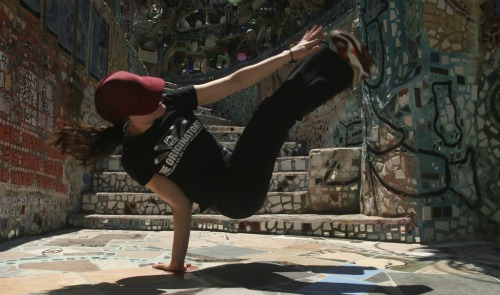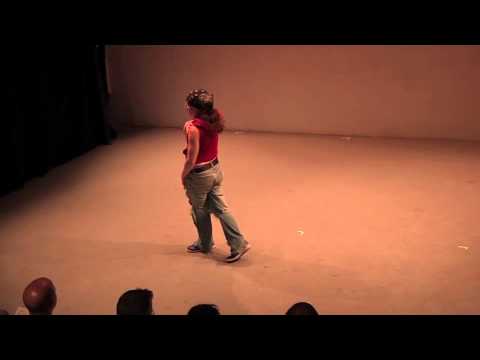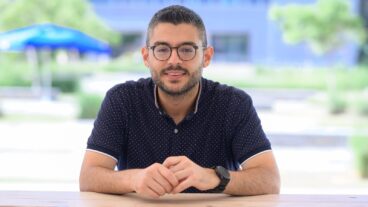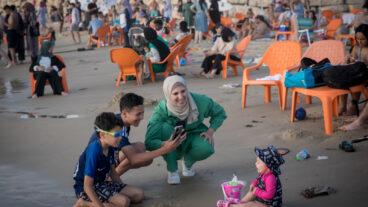Break-dancer ‘Bounce,’ aka Ephrat Asherie, broke into an urban art form that’s unusual for Barnard grads. Her parents’ Israeli attitude helped.

It’s probably safe to say that Ephrat Asherie is the only summa cum laude graduate of Barnard College who makes her living break-dancing. It’s also likely she’s the only Israeli-born b-girl to excel in a genre dominated by b-boys.
Asherie does her moves with FoxForceFive and MAWU, and recently performed in the European show Magnifico, choreographed by the famed Pilobolus. In September, she curated “Looking Back,” an evening of underground and contemporary dance at the Manhattan experimental theater Dixon Place.
Living in Harlem, teaching at Broadway Dance Center and performing and choreographing around the world, Asherie — aka “Bounce” — was born in 1981 in coastal Netanya north of Tel Aviv. Her parents moved with their four sons and baby daughter to Italy 10 months later and to suburban Larchmont, New York, six years after that as a result of her father’s job.
Yet even far from the land of her birth, she tells ISRAEL21c that she always felt as Israeli as the passport she still uses to travel to her homeland at least once a year.
“I felt a difference between myself and American Jews because we were raised with a very practical attitude: We were taught that we shouldn’t complain about anything since we had what to eat and what to wear. Looking back, I realize that was something very Israeli.”
And so was the overall parental message to “do what you love and enjoy and excel at.” What she loved was dance.

“I wanted to be my brothers when I grew up,” she admits. “I didn’t want to be a boy, but I wanted to run as fast as them and be as smart as them.” Her recent solo, Brothers, is about the evolution of that desire.
Video of “Brothers”
Her mom encouraged her to ditch soccer for ballet lessons when she was 10. This training pointed her in a new direction. “My build isn’t right to be a ballerina but I knew there would be another way to dance,” she says. “I had the feeling I’d find it.”
‘I have a lot of energy’
And she did, during college. The pivotal moment was watching Rennie Harris Puremovement’s hip-hop version of Romeo and Juliet (Rome & Jewels). “It was phenomenal. I saw it twice and fell in love with it,” she recalls.
In 2002, she began training with the legendary Brooklyn break-dancer Richard Santiago (aka Break Easy), who nicknamed her “Bounce.”
“I was completely hungry and devoted. Through rain, sleet or snow, I’d go to Bushwick from Harlem to go to practice,” she recalls. To support herself, she worked as an administrative assistant at a modern dance company and waited tables.
“I have a lot of energy,” she says, comparing herself to her “super Zionist” maternal grandfather, “a dancer and a fighter” who moved to Israel from Europe and worked in the mines of the Dead Sea. He danced with her at a wedding shortly before he died 16 years ago.
Asherie has come close to fulfilling her childhood fantasy of becoming her brothers, because break-dancing is mainly the purview of males. Attracting attention as one of few b-girls at “battles,” high-energy break-dance competitions, she signed with an agency, quit her other jobs and began teaching break, hip-hop and “house,” an underground style born in Chicago.
She also teaches at the Peridance Capezio Center, owned by Igal Perry, whose roots are with the Israeli dance companies Jonathan Karmon and Bat-Dor. And Asherie taught several young Israelis in a hip-hop class at the Joffrey Ballet School.
“I adored them,” Asherie says. “They have a great deal of vitality. I say to myself that if I had stayed in Israel, this would have been me, and I feel a sort of camaraderie.”
She has also taught in Israel the past two years. “Israel has a thriving b-boy scene,” she says. One of the key players is Dvir Rozen, director of the Israel Breakdancing Association and his own company, Street Art Productions.
“Break-dancing keeps developing and changing because the essence of all urban dance is to keep creating and to strive for originality,” says Asherie, who has performed and taught in Europe, Peru and South Africa. She’s appeared on television and at Carnegie Hall and Madison Square Garden. Coming full circle, she has even become a regular guest artist with Philadelphia-based Rennie Harris Puremovement.
The Asherie siblings are scattered among Jerusalem, London, and New York. They work in fields ranging from physics to jazz piano.
“Our parents raised us to do what we believe in,” says Asherie, acknowledging that dance is not the most secure of professions and takes its toll physically; she’s already had one knee surgery.
“Any artist comes to terms with the fact that nobody holds a gun to your head to do your art. If that’s what you choose to do, you have to deal with the instability. Don’t complain about it; just do it. That is a very Israeli approach.”














